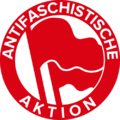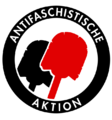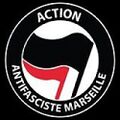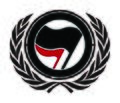Social:Post-WWII anti-fascism
Antifa movements (/ænˈtiːfə, ˈæntiˌfɑː/)[1] and Anti-Fascist Action networks are left wing, often anarchist, extra-parliamentary and often violent political movements that describe themselves as anti-fascist. Such movements have been active in several countries in the second half of the 20th and early 21st century.
History
Germany
Antifaschistische Aktion, an umbrella organisation for militant anti-fascists in Germany, was formed in 1932. It was sometimes called "Antifa". Although it did not survive the war, local anti-fascist committees were formed across Germany, typically by veterans of this organisation, as Nazi rule crumbled in 1944, under the name "Antifa".[2] These anti-fascist committees often included communists, social democrats, and progressive Christians.[3]
In Communist East Germany, anti-fascism became part of the official ideology of state, and the abbreviation Antifa was used for various organs of the Communist state. For example, from 1961, the East German Socialist Unity Party used the term "Anti-Fascist Protection Rampart" (German: Antifaschistischer Schutzwall) as the official name for the Berlin Wall, in sharp contrast to the West Berlin city government which would sometimes refer to it as the "Wall of Shame".[4][5]
The modern Germany movement most commonly associated with anti-fascism originated in the late 1980s, growing out of West Germany's squatter scene and autonomism movement.[6] This movement ultimately has its origins in the student-based Außerparlamentarische Opposition and the values associated with the new social movements. Unlike the 1930s Antifaschistische Aktion, which was linked to the Communist Party of Germany, concerned with industrial working-class politics against Hitler's NSDAP, the late 1980s and early 1990s "autonomists" were instead independent "anti-authoritarian" Libertarian Marxists and anarcho-communists, not associated with any particular party. The publication Antifaschistisches Infoblatt was in operation since 1987, seeking to expose radical nationalists publicly. In 2003, they joined Antifa-Net, part of an international network, including the likes of Britain's Searchlight and Sweden's Expo.
It was after German reunification in 1990, that most of the Antifa groups were formed. For example, the Autonomen Antifa (M) was created in Göttingen in 1990. Following the rise of the National Democratic Party of Germany and some actions of extra-parliamentary violence such as the Solingen arson attack of 1993, more groups were formed.[7] Antifaschistische Aktion Berlin, founded in 1993 was one of the more prominent groups and the Antifaschistische Aktion/Bundesweite Organisation was founded to coordinate these groups across Germany. Aside from their violent clashes with ultra-nationalists, these groups participated in the annual May Day in Kreuzberg, which typically ends in large scale riots. The German Antifa movement later fractured into three camps after German Reunification;[8] the Anti-Germans (who stress the importance of people of all races uniting across national lines, who support Israel), the Anti-Imperialists (who tend to view politics in terms of how a country relates to the west, who take a position of Anti-Zionism and reject a peaceful, two-state solution to the Israeli-Palestinian conflict), and those who have no position on Israel or see it as irrelevant to questions of contemporary anti-fascism in Germany. The Antifaschistische Aktion/Bundesweite Organisation splintered into different groups and factions as a result of these political differences, which remain bitterly contested to this day.
According to the Germany intelligence agency Federal Office for the Protection of the Constitution, the contemporary anti-fascist movement in Germany includes those who are willing to use violence.[9] Militant behaviour against police is an expression of the "Autonome Szene" and part of the concept "Antifaschistische Aktion". There are illustrations made public in the antifascist movement with mottoes that sometimes call for not only violence against police or skinheads but also bishops and judges. There are slogans like "antifascism means attack" not only against neonazis but also against the civil and capitalist system of the "Bundesrepublik Deutschland".[10] Anti-fascist is sometimes shortened to "Antifa".[11] One of the bigger antifascist campaigns in Germany in recent years was the effort to block the annual Neo-Nazi marches in Dresden.
Sweden: Antifascistisk Aktion activities
Militant anti-fascism emerged in Sweden in the early 1990s, in particular around the yearly November 30 protests in Lund and Stockholm propelled by blockades of neo-nazi marches in both cities in 1991.[12] The main militant antifascist group in the country is the Antifascistisk Aktion (AFA), founded in Sweden in 1993. AFA's Activity Guide advocates violence against neo-Nazis. Some in the mainstream media have labelled them left-wing extremists.[13][14][15] An editorial in the tabloid newspaper Expressen argued that the label anti-fascist was misleading, because of the organization's methods,[16] such as stealing the subscriber list of the National Democrats newspaper, and threatening the subscribers.[16] Other critics say the group does not respect freedom of speech, because some members have attacked moderate conservatives and other nationalists.[17][verification needed]
United States
After World War II, but prior to the development of the modern antifa movement, violent confrontations with Fascist elements happened sporadically in the United States . In 1958 over 500 Lumbee men armed with rocks, sticks and firearms attacked and disrupted a Ku Klux Klan rally, wounding several Klansmen in an event known as the Battle of Hayes Pond. In 1979 the Maoist Communist Workers' Party confronted a local Ku Klux Klan chapter, first by disrupting a screening of The Birth of a Nation in China Grove, North Carolina and later organizing a rally and a march against the Klan on November 3 called the "Death to the Klan March" by the CWP.[18] The Maoists distributed flyers that "called for radical, even violent opposition to the Klan",[18] suggesting the Klan “should be physically beaten and chased out of town."[18] In response, as the marchers collected, a caravan of ten cars (and a van) filled with an estimated 40 KKK and American Nazi Party members confronted the protesters, culminating in a shootout known as the Greensboro Massacre.
In the 2010s, self-described antifa groups have become increasingly active in Western Europe and North America.[19] These loose collectives first arose in the early 2010s in response to growing nationalism in countries including the United States, United Kingdom, Denmark, Germany, and France.[20][21][22] In the US, anti-fascist groups had existed since at least 1988 in the form of the Anti-Racist Action,[23] but an American movement using the same name has become increasingly active since 2016,[24][25] often affiliated with anarchism, and have become known for their clashes with far-right and alt-right groups.[23][26][27] US anti-fascist activities have included violent disruptions and demonstrations which have drawn criticism from both sides of the mainstream political spectrum.[19][22][28] Through their anarchist and anti-nationalist orientation, antifa groups have sometimes been linked to the punk subculture (including straight edge) both in the US and in Europe.[29]
Gallery
Toilet brush symbol adopted for the Hamburg protests (Antifaschistische Aktion (Germany)
See Also
- Black bloc
- Red bloc
- Diversity of tactics
References
- ↑ "Language Log » Ask Language Log: How to pronounce "Antifa"?". http://languagelog.ldc.upenn.edu/nll/?p=34177. Retrieved September 23, 2017.
- ↑ Loren Balhorn The Lost History of Antifa" Jacobin May 2017
- ↑ Pritchard, Gareth (2012). Niemandsland: A History of Unoccupied Germany, 1944-1945. Cambridge University Press. ISBN 110701350X.
- ↑ Berlin Wall: Five things you might not know, The Telegraph, 11 August 2011
- ↑ "13. August 1961: Mauerbau in Berlin" (in de). http://www.chronik-der-mauer.de/node/178754. Retrieved 16 July 2015.
- ↑ "The Lost History of Antifa". Jacobin Mag. 15 August 2017. https://www.jacobinmag.com/2017/05/antifascist-movements-hitler-nazis-kpd-spd-germany-cold-war. Retrieved 5 December 2014.
- ↑ (in German) Opfer-Rechter-Gewalt
- ↑ Ogman, Robert (2013). Against The Nation. New Compass Press. ISBN 9788293064206.
- ↑ "Verfassungsschutz-bericht 2015" (in German) (PDF). Verfassungsschutz.de. pp. 97–102. https://www.verfassungsschutz.de/de/download-manager/_vsbericht-2015.pdf.
- ↑ "Antifaschismus als Thema linksextremistischer Agitation, Bündnispolitik und Ideologie". 6 March 2008. http://www.bpb.de/politik/extremismus/linksextremismus/33612/antifaschismus?p=all.
- ↑ "Antifa | Definition of Antifa in English by Oxford Dictionaries". Oxford University Press. https://en.oxforddictionaries.com/definition/antifa. Retrieved 3 October 2017.
- ↑ Brink Pinto, Andrés; Pries, Johan (2017). Wennerhag, Magnus; Fröhlich, Christian; Piotrowski], Grzegorz. eds. Rethinking transformative events to understand the making of new contentious performances: The “autonomous left” and the anti-fascist blockade in Lund 1991. Routledge. https://www.academia.edu/34629137/Rethinking_transformative_events_to_understand_the_making_of_new_contentious_performances_The_autonomous_left_and_the_anti-fascist_blockade_in_Lund_1991_excerpt_.
- ↑ "Polisen: Afa bakom upplopp i Fittja – Nyheter" (in Swedish). SVT.se. 29 October 2009. https://www.svt.se/nyheter/lokalt/stockholm/polisen-afa-bakom-upplopp-i-fittja. Retrieved 7 April 2014.
- ↑ "10 Afa-anhängare begärdes häktade" (in Swedish). svt.se. 1 November 2012. Archived from the original on 1 October 2011. https://web.archive.org/web/20111001073801/http://mobil.svt.se/2.33538/1.1752021/10_afa-anhangare_begardes_haktade. Retrieved 8 March 2018.
- ↑ Claes Petersson (13 September 2009). "Slåss med knogjärn | Nyheter | Aftonbladet" (in Swedish). Aftonbladet.se. http://www.aftonbladet.se/nyheter/article5784027.ab. Retrieved 7 April 2014.
- ↑ Jump up to: 16.0 16.1 "090215: Stoppa AFA | Ledare | Expressen" (in Swedish). Expressen.se. 15 February 2009. http://www.expressen.se/ledare/1.1466908/090215-stoppa-afa. Retrieved 7 April 2014.
- ↑ "Vänsterextrema infiltrerade IOGT-NTO" (in Swedish). Svenska Dagbladet. 7 September 2006. http://www.svd.se/nyheter/inrikes/artikel_454715.svd. Retrieved 8 December 2006.
- ↑ Jump up to: 18.0 18.1 18.2 "The Greensboro Massacre". University of North Carolina – Greensboro. https://library.uncg.edu/dp/crg/topicalessays/GreensMassacre.aspx. Retrieved 2014-02-02.
- ↑ Jump up to: 19.0 19.1 Stockman, Farah (2 Feb 2017). "Anarchists Respond to Trump’s Inauguration, by Any Means Necessary". New York Times. https://www.nytimes.com/2017/02/02/us/anarchists-respond-to-trumps-inauguration-by-any-means-necessary.html. Retrieved 10 July 2017.
- ↑ Copsey, Nigel (2017). Anti-Fascism in Britain. Abingdon, UK: Routledge. p. 210. ISBN 9781138926493.
- ↑ Horn, Heather (29 March 2012). "Anti-Islamic vs. Anti-Fascist: Europe's Clashing Protest Movements". The Atlantic. https://www.theatlantic.com/international/archive/2012/03/anti-islamic-vs-anti-fascist-europes-clashing-protest-movements/255214/. Retrieved 10 July 2017.
- ↑ Jump up to: 22.0 22.1 Yates, Will (20 February 2017). "America's extremist battle: antifa v alt-right". BBC News. https://www.bbc.com/news/blogs-trending-39004753. Retrieved 22 February 2017.
- ↑ Jump up to: 23.0 23.1 Strickland, Patrick (21 February 2017). "US anti-fascists: 'We can make racists afraid again'". Aljazeera. http://www.aljazeera.com/indepth/features/2017/02/anti-fascists-racists-afraid-170221100950730.html. Retrieved 10 July 2017.
- ↑ Beinhart, Peter. "The Rise of the Violent Left". The Atlantic. https://www.theatlantic.com/magazine/archive/2017/09/the-rise-of-the-violent-left/534192/. Retrieved 12 August 2017.
- ↑ "Behind Berkeley’s Semester of Hate". New York Times. 4 August 2017. https://www.nytimes.com/2017/08/04/education/edlife/antifa-collective-university-california-berkeley.html?_r=0. Retrieved 12 August 2017.
- ↑ "UK police arrest 12 at London protest, block clashes". Business Insider. 1 April 2017. http://www.businessinsider.com/ap-uk-police-arrest-12-at-london-protest-block-clashes-2017-4. Retrieved 10 July 2017.
- ↑ Osborne, Samuel (25 June 2017). "EDL and anti-fascists clash with police in London". Independent. https://www.independent.co.uk/news/uk/home-news/edl-english-defence-league-anti-fascists-clash-police-london-britain-first-birmingham-a7807401.html. Retrieved 10 July 2017.
- ↑ Sheffield, Matthews (10 March 2017). "Anti-fascist radicals: Liberals don’t realize the serious danger of the alt-right". Salon. http://www.salon.com/2017/03/10/anti-fascist-radicals-liberals-dont-realize-the-serious-danger-of-the-alt-right/. Retrieved 10 July 2017.
- ↑ Kuhn, Gabriel (2010). Sober Living for the Revolution: Hardcore Punk, Straight Edge, and Radical Politics. PM Press. p. 137. ISBN 1604860510. https://books.google.cz/books?id=YWb7BgAAQBAJ&pg=PA137#v=onepage&q&f=false. Retrieved 7 October 2017.

















